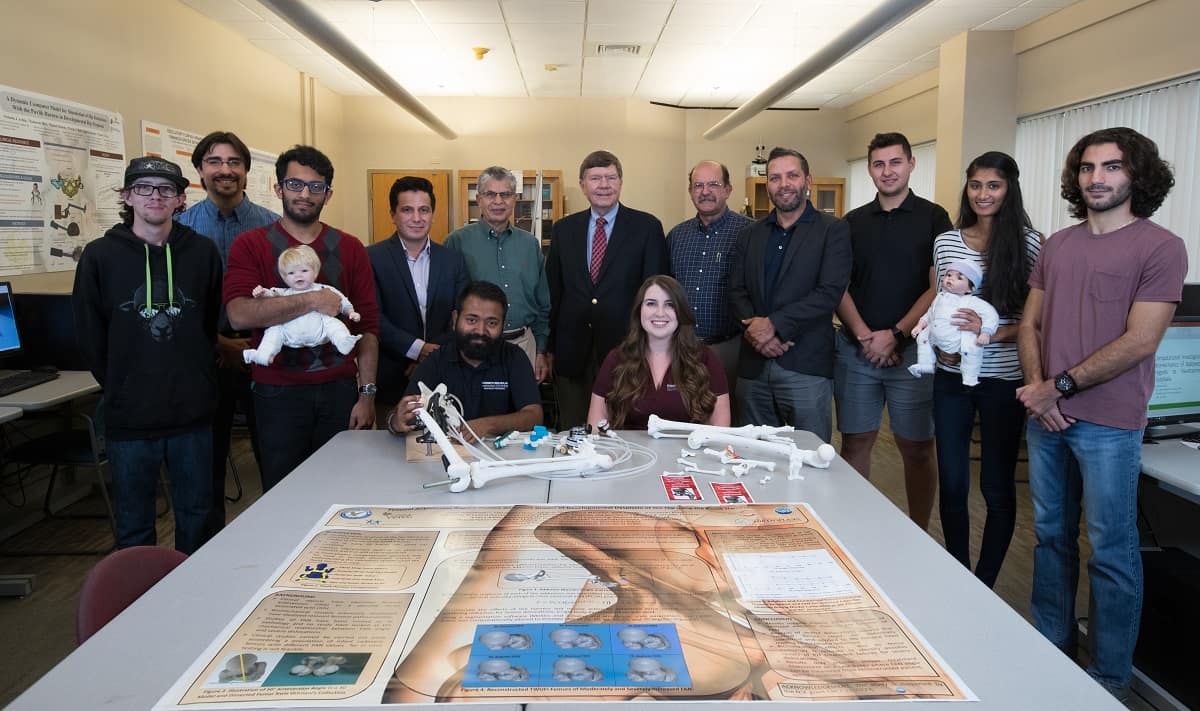Meet the Research Team that is Working to Help Infants Overcome Severe Hip Dysplasia – Without Surgery

“The research being conducted at Embry-Riddle has a strong possibility of improving the mechanical function of modern braces. It has real potential to extend non-surgical treatment to older children in addition to improving success rates for newborn infants.”
- Dr. Charles T. Price, M.D., Arnold Palmer Hospital for Children
The public is invited to attend this free SpeakER Series Event on Feb. 27 at 7 p.m. in the Willie Miller Instructional Center, Gale Lemerand Auditorium, 600 S. Clyde Morris Click here for a map of the campus.
A team of researchers at Embry-Riddle will discuss their work on strategies to help infants with severe hip dysplasia avoid surgery.
It’s a research topic you wouldn’t expect to hear discussed at a leading aeronautical and aerospace university, but – just as many innovations that originated at NASA wind up serving society more broadly, from the materials used in spacesuits to the foods that astronauts eat – Embry-Riddle works to translate new knowledge to improve people’s lives.
You can learn more about the research at Embry-Riddle’s Daytona Beach, Fla., campus on Tuesday, Feb. 27, at 7 p.m. in the Willie Miller Instructional Center, Lemerand Auditorium.
The research remains preliminary but it could point to broader options for parents whose newborns have the most severe form of hip dysplasia (Grade IV).
The Embry-Riddle SpeakER Series event, moderated by Marc Bernier, is free and open to the public.
Speaking at the event will be:
- Dr. Charles T. Price, M.D., pediatric orthopedic surgeon, Arnold Palmer Hospital for Children Level One Pediatric Orthopedics, and director, International Hip Dysplasia Institute (IHDI)
- Dr. Eduardo Divo, Embry-Riddle Ph.D. program chair and interim department chair, Mechanical Engineering
- Dr. Victor Huayamave, assistant professor of mechanical engineering
Embry-Riddle graduate student Jansyn Johnston, president of the university’s Biomedical Engineering Society, will also be on hand, along with Lauren Parr, an Orlando, Fla., attorney whose daughter Tori was born with hip dysplasia.
While milder forms of the condition can often be corrected by placing infants in a special Pavlik harness, the device frequently fails to help babies with Grade IV hip dysplasia. That’s why Divo and Huayamave, with colleagues at the IHDI and the University of Central Florida, are using 3D computer modeling to simulate hip dysplasia reduction strategies and to study different engineering solutions.
“The research being conducted at Embry-Riddle has a strong possibility of improving the mechanical function of modern braces,” Price said. “It has real potential to extend non-surgical treatment to older children in addition to improving success rates for newborn infants.”
The research is being funded by the IHDI and the Paul B. Hunter and Constance D. Hunter Charitable Foundation. The work, reported by Melanie Azam, will be featured in Embry-Riddle’s spring 2018 edition of ResearchER magazine.

 Ginger Pinholster
Ginger Pinholster